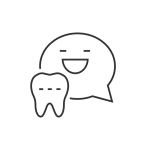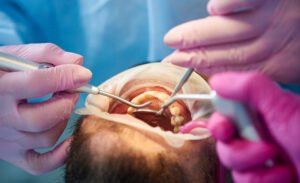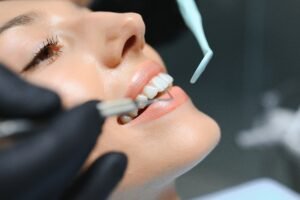Maintaining healthy teeth and gums requires basic dental cleaning treatment twice a year. Removing tartar from the patient’s teeth during a cleaning aids in preventing tooth decay. The elimination of tartar further enhances the look of the person’s teeth.
Plaques left on tooth surfaces long become hardened and form tartar. It is the ideal habitat for the bacteria that reside in people’s mouths and produce acid. Brushing and flossing will not help you get rid of it; only professional dental cleaning treatment by a dentist can.
You can receive dental cleaning treatment in any dental cleaning clinic in Calgary.
Even though cleanings are one of the least invasive dental treatments, many people experience anxiety when it’s time to clean their teeth. Some might attribute this to teeth and gums frequently experiencing soreness and sensitivity for a few days following cleaning.
Read More: The Benefits of Orthodontic Treatment in Calgary: Beyond Straight Teeth
Why do you need teeth cleaning?
The plague will eventually build up even if we do not keep our teeth clean. This generally occurs in locations that are hard to reach with a toothbrush or dental floss. Additionally, it can happen when people wash their teeth improperly. Tooth calculus, sometimes referred to as tartar, results from dental plaque becoming hardened over time.
Both are bad for oral health since they contribute to the main causes of tooth loss, gum disease and tooth decay. They also result in poor breath. Plaque and tartar will be removed during the teeth cleaning session, helping you enhance your mouth’s condition. Now you might ask how often you should prefer professional dental cleaning sessions and the answer is once or twice a year will help you keep a check on your dental health.
What happens during the teeth cleaning session?
A dentist will evaluate your oral cavity in the initial phase to better understand how the session should proceed by checking for places with more plaque and tartar development. They will next administer numbing gel to your gums to lessen any pain you may have.
Must See: A Parent’s Guide to Children’s Dental Care: Establishing Healthy Habits Early
Your dentist will use a scalar tool to scrape the plaque and tartar accumulated between your teeth and the gumline after numbing your gums.
The Best Dentist in Calgary will use an electric toothbrush and toothpaste with grit to remove any remaining plaque and polish your teeth once all the tartar has been removed. Your teeth will get whiter, and certain surface stains may be removed. The next step is a professional flossing demonstration by your dentist.
Your dentist could provide you with some advice on how to enhance your flossing technique to avoid the formation of tartar during this period. Finally, your dentist will give your teeth a minute-long fluoride treatment. Your teeth’s surface will remineralize. As a result, it will prevent tooth decay.
Teeth cleaning aftercare
Do not intake anything when your mouth is numb
The urge to have something after a deep dental cleaning Calgary increases since most patients are advised to avoid eating much before the treatment. However, you must wait to eat until the anesthesia’s numbness subsides. You may likely bite your tongue or gums while eating while your mouth is still numb, which might stop the healing process.
Check Now: What Is a Dental Bridge and How Does It Improve Oral Health?
Avoid hot foods and drinks
Fluoride can be removed before it has a chance to become permanently fixed by hot meals and beverages. A patient with sensitive teeth and painful gums may find the heat bothersome after the cleaning.
Brush gently
Be mindful when brushing your teeth and gums using a toothbrush with soft bristles. Even though it may be tempting to skip the midnight brush, clean your teeth anyway unless your dentist instructs you otherwise.
Read More: Understanding Different Types Of Root Canal Treatments
Take pain medication
Taking an over-the-counter pain reliever before getting a dental cleaning is completely acceptable. The irritation frequently linked to this therapy is lessened by this prophylactic intervention. Some painkillers contain drugs that help patients feel more at ease while receiving therapy.
Look out for warning signs
It’s always good to pay attention to the smallest aspect of your teeth and gums. As you check your teeth, check out for certain unpleasant symptoms, including foul breath, bleeding gums, sensitive and swollen gums, cavities, and receding gums. You should discuss these symptoms with your dentist.
Read More: What are the Different Types of Professional Teeth Whitening Treatments?
Rinse with salt water
After the first 48 hours, you will be instructed to rinse your mouth with salt water at least 4 to 6 times daily to maintain a healthy, bacteria-free mouth.
Benefits of dental cleaning
Prevents tooth decay & cavities
To avoid cavities, people visit the dentist most frequently. The outer covering of your teeth, the enamel, starts to erode as plaque produces these holes.
On your teeth, plaque builds up as a sticky, white film of germs. Plaque may be expelled by brushing and flossing twice daily, but professional cleanings every six months are much more effective.
Remove stains
Daily practises, including consuming coffee, tea, and alcohol and using tobacco products, can discolour your teeth. But it can be removed by brushing, although some tough stains may still be present. To brighten your smile, complete teeth cleaning in Calgary and polishing from your dentist may erase this.
Read More: Common Orthodontic Problems, and How to Treat Them?
Avoid gum disease
Plaque not only causes tooth decay, but it also harms your gums when it accumulates below the gum line. Gum disease can cause tooth loss if it progresses to an advanced stage. Fortunately, frequent tooth cleaning reduces plaque accumulation and significantly lowers your risk of experiencing this.
Overall dental health
More often than you probably think, your mouth impacts the rest of your body. Going to the dentist frequently can significantly reduce your stroke risk.
This is because the persistent inflammation brought on by gum disease may result in artery hardening, resulting in a stroke. The dentist can help you find other seemingly unrelated medical concerns, such as kidney disease and diabetes.
Must See: Things to Do When You Have an Emergency Dental Situation
Conclusion
Dental cleanings can provide a wide range of advantages. As a result, you should always make time for consistent appointments at your dentist’s clinic. It is the finest approach to maintaining a healthy smile and avoiding significant health issues. Cleaning your teeth regularly is a great oral hygiene habit. If you don’t follow sound aftercare advice, the teeth cleaning process may not go as planned.















